Can Supplements Support Trauma Recovery? Evidence & Insights
Introduction
Trauma leaves more than emotional scars—it imprints itself on the body, the brain, and even the biochemistry that keeps us alive. Whether it’s the result of childhood neglect, an accident, abuse, or combat exposure, trauma changes how our nervous system functions. It alters stress hormones, sleep patterns, inflammation levels, and even the balance of neurotransmitters that regulate mood and resilience.
As trauma research advances, scientists are uncovering something remarkable: biological healing and psychological recovery go hand in hand. Nutritional supplements—when used alongside therapy, mindfulness, and lifestyle strategies—can help restore equilibrium to a body that’s been living in survival mode.
This article explores how trauma affects the body, the role of nutrients and adaptogens in supporting recovery, and what evidence-backed supplements may assist in rebuilding both mind and body after trauma.
Looking for supplements for This? Click here.
🌪️ Trauma’s Impact on the Body: More Than a Mental Wound

When you experience trauma, your brain interprets it as a threat to survival. This activates the fight, flight, freeze, or fawn response, flooding your body with stress hormones like cortisol and adrenaline.
In the short term, these chemicals help you survive danger. But in cases of repeated or unresolved trauma, this response becomes chronic, leading to:
HPA-axis dysregulation (your stress-control system gets “stuck on”)
Adrenal exhaustion and disrupted cortisol patterns
Inflammation that damages neurons and tissues
Neurotransmitter imbalances, especially serotonin, dopamine, and GABA
Sleep disturbances and fatigue
Digestive and immune dysfunction
This physiological chaos explains why trauma survivors often experience both emotional and physical symptoms—anxiety, depression, fatigue, brain fog, digestive distress, or chronic pain.
🧬 The Biology of Trauma: How the Nervous System Remembers
According to Dr. Bessel van der Kolk, author of The Body Keeps the Score, trauma doesn’t simply live in the mind—it’s stored in the body and nervous system. The amygdala (fear center) stays hyperactive, while the prefrontal cortex (rational mind) weakens its ability to calm it down.
The body remains primed for danger, even when there’s none. This “survival wiring” leads to hypervigilance, startle responses, and exhaustion. Over time, chronic stress depletes nutrients and disrupts brain chemistry.
The good news: this process is reversible. Through therapy, mindfulness, and nutritional replenishment, the brain and body can learn safety again.
🌿 How Supplements May Help in Trauma Recovery
Supplements can’t erase traumatic memories—but they can help restore the physiological foundation for healing by:
Rebalancing stress hormones like cortisol and adrenaline
Supporting neurotransmitter synthesis (serotonin, dopamine, GABA)
Reducing oxidative stress and inflammation in the brain
Improving energy metabolism in nerve cells
Enhancing sleep and emotional regulation
Think of supplements as the biochemical scaffolding that helps therapy and self-work take deeper root. When the body feels nourished and stable, emotional healing becomes more sustainable.
🧘 Adaptogens: Rebalancing a Stressed Nervous System
Adaptogens are natural herbs that help the body adapt to stress, modulate cortisol levels, and restore energy without overstimulation. They are among the most researched supplements for trauma-related fatigue and anxiety.
Ashwagandha (Withania somnifera)
Shown in multiple studies to lower cortisol levels by up to 30%.
Improves sleep quality, reduces anxiety, and supports adrenal recovery.
Helps rebuild resilience in those experiencing chronic stress or emotional burnout.
Rhodiola Rosea
Enhances energy and concentration.
Supports serotonin and dopamine balance.
Especially helpful for trauma survivors dealing with fatigue and mental fog.
Holy Basil (Tulsi)
Reduces stress-induced inflammation.
Calms racing thoughts and balances blood sugar.
Gentle and ideal for daily use.
Reishi Mushroom (Ganoderma lucidum)
Promotes relaxation and immune recovery.
Known as the “mushroom of calm” for its adaptogenic and anti-inflammatory properties.
Excellent for evening use to calm an overactive mind.
Adaptogens work gradually over weeks, helping regulate the hypothalamic-pituitary-adrenal (HPA) axis—the control center of the stress response.
Looking for supplements for This? Click here.
💊 B Vitamins: Rebuilding Energy and Emotional Stability
Trauma drains B vitamins, which are crucial for neurotransmitter production, nerve function, and energy metabolism. Deficiencies can worsen symptoms like anxiety, depression, and fatigue.
B1 (Thiamine): Restores energy and mental clarity.
B5 (Pantothenic Acid): Essential for adrenal health and cortisol balance.
B6 (Pyridoxine): Converts tryptophan to serotonin, supporting mood stability.
B9 (Folate) and B12: Promote myelin repair (nerve protection) and prevent depressive symptoms.
A high-quality B-complex supplement supports the nervous system holistically and should be part of any trauma recovery plan.
🧠 Omega-3 Fatty Acids: Healing the Brain
Trauma can shrink the hippocampus (the brain’s memory center) and increase inflammation in the brain. Omega-3 fatty acids—especially EPA and DHA—support neuronal repair, reduce inflammation, and enhance mood regulation.
Benefits of Omega-3s in trauma recovery:
Decrease neuroinflammation and oxidative damage.
Support neurotransmitter receptor function.
Improve cognitive flexibility and emotional control.
Enhance the effects of therapy by improving brain plasticity.
Dosage: 1000–2000 mg of combined EPA/DHA daily (from fish oil or algae-based sources).
Studies show that higher omega-3 intake can reduce PTSD and anxiety symptoms, especially when combined with therapy or mindfulness practices.
🌙 Magnesium: Calming the Body and Mind
Magnesium is one of the most crucial nutrients for people recovering from trauma. It supports over 300 enzymatic reactions, many of which are involved in nervous system regulation.
How it helps:
Reduces hyperarousal and anxiety by activating GABA receptors.
Promotes relaxation and deeper sleep.
Helps regulate cortisol release and muscle tension.
Best forms:
Magnesium glycinate for relaxation and sleep.
Magnesium threonate for cognitive support (crosses the blood-brain barrier).
Tip: Taking magnesium before bed can significantly improve sleep quality and reduce nighttime restlessness common in trauma survivors.
💧 Vitamin D and Zinc: Hormonal and Immune Support

Both Vitamin D and zinc play important roles in immune regulation, mood stabilization, and inflammation control—all areas affected by trauma.
Vitamin D3:
Modulates immune function and supports serotonin synthesis.
Low levels are linked to depression and PTSD symptoms.
Acts as a hormonal regulator, helping normalize cortisol rhythms.
Zinc:
Supports brain neurotransmitters and the stress response.
Deficiency is associated with anxiety and poor mood regulation.
Together, they help maintain biochemical stability and reduce inflammation triggered by chronic stress.
🌾 L-Theanine and Phosphatidylserine: Calming Cortisol Spikes
L-Theanine, an amino acid from green tea, promotes calm without sedation. It helps restore alpha brain wave activity, bringing a state of relaxed alertness—ideal for trauma survivors dealing with hypervigilance.
Phosphatidylserine (PS) reduces cortisol surges and protects brain cells from stress-induced damage. Studies show it helps blunt stress responses and improve focus after exposure to psychological stressors.
Stack tip: Combining L-Theanine (100–200 mg) with PS (200–400 mg) provides both mental calmness and biological regulation, ideal before stressful situations or therapy sessions.
🍄 NAC and Antioxidants: Reducing Oxidative Stress from Trauma
Chronic stress and trauma generate high levels of free radicals, damaging cells and impairing brain function. N-Acetyl-Cysteine (NAC) helps boost glutathione, the body’s most powerful antioxidant.
Benefits of NAC:
Reduces oxidative stress and inflammation in the brain.
Supports detoxification and immune balance.
Improves emotional regulation and cognitive clarity.
🌸 Probiotics: Healing the Gut-Brain Axis
Trauma doesn’t only affect the brain—it impacts the gut microbiome, which communicates directly with the nervous system via the vagus nerve. A healthy microbiome produces neurotransmitters like serotonin and GABA, essential for calm and emotional balance.
How probiotics help trauma survivors:
Lower systemic inflammation.
Improve serotonin production in the gut.
Enhance stress resilience and mood stability.
Choose a probiotic containing Lactobacillus and Bifidobacterium strains. Combine with prebiotic fibers (in foods like oats, bananas, and garlic) to nourish beneficial bacteria.
Other antioxidants like Vitamin C, Alpha-Lipoic Acid, and CoQ10 complement NAC by supporting mitochondrial energy and repair.
🌼 Amino Acids: Rebuilding Neurotransmitters
Chronic stress depletes amino acids—the raw materials for neurotransmitters. Supplementing specific amino acids can help restore emotional balance.
Tryptophan or 5-HTP: Support serotonin production and positive mood.
Tyrosine: Precursor for dopamine and norepinephrine, enhancing motivation.
GABA (gamma-aminobutyric acid): Promotes calm and reduces hyperarousal.
Amino acids can be used strategically—tryptophan and GABA at night for calm, tyrosine in the morning for focus.
🌙 Sleep and Nervous System Restoration
Trauma disrupts the body’s natural circadian rhythms, often leading to insomnia or nightmares. Supplements that support sleep can accelerate nervous system healing.
Effective options include:
Glycine (3g): Helps lower body temperature and calm the nervous system.
Melatonin (0.5–3 mg): Regulates sleep cycles disrupted by cortisol imbalance.
Herbal aids: Chamomile, Lemon Balm, and Valerian root gently induce relaxation.
When sleep improves, cortisol balance and emotional regulation follow.
⚖️ Integrating Supplements with Therapy
Supplements alone can’t heal trauma, but they can enhance your ability to heal. When the body is calm and nourished, therapeutic interventions such as EMDR, Somatic Experiencing, or Cognitive Behavioral Therapy (CBT) work more effectively.
The integration approach:
Therapy: Processes and reframes traumatic memories.
Supplements: Stabilize biochemistry, support focus and calm.
Breathwork and Yoga: Reconnect body awareness and regulate the nervous system.
Want to try Breathwork? Click Here.
Nutrition: Provides the raw materials for neurotransmitter repair.
Together, these methods create a holistic environment for recovery—psychological, physiological, and emotional.
🩹 Precautions and Guidance
While many supplements are safe, it’s important to:
Consult a health professional before starting any new supplement, especially if taking medications.
Avoid combining multiple adaptogens or high doses at once.
Start low and increase gradually to gauge response.
Remember that supplements enhance—but don’t replace—professional trauma therapy.
Healing trauma is complex, and biological support should complement—not substitute—psychological healing.
🌿 Sample Trauma Recovery Stack (Morning, Midday, Evening)
Morning:
Ashwagandha 300 mg
B-Complex
Vitamin D3 + Omega-3
Rhodiola 200 mg
Midday:
L-Theanine 100 mg
Phosphatidylserine 200 mg
Zinc 15–30 mg
Evening:
Magnesium Glycinate 300 mg
Reishi Extract or Lemon Balm Tea
NAC 600 mg + Vitamin C 1000 mg
This combination supports cortisol regulation, neurotransmitter balance, and nervous system relaxation.
💫 Beyond Supplements: The Lifestyle Foundations of Recovery
No supplement can replace the essentials: rest, connection, and safety. But when combined with a nurturing environment, they become powerful allies in restoring harmony.
Other keys to trauma recovery include:
Regular movement: Gentle yoga, walking, or somatic exercises.
Mindful breathing: Activates the vagus nerve and calms the body.
Sunlight and nature exposure: Regulates circadian rhythms and mood.
Social connection: Builds oxytocin, counteracting fear responses.
When the body feels safe, the mind can begin to trust again.
🌻 The Future of Trauma Healing: Integrative Neuroscience
Modern trauma therapy increasingly recognizes that mental and physical recovery are inseparable. Supplements, nutrition, and lifestyle interventions are no longer “alternative”—they’re essential biological supports for emotional healing.
Emerging research into nutrients like omega-3s, magnesium, and adaptogens shows that they don’t just ease symptoms—they help rebuild the brain’s capacity for safety, regulation, and connection.
🌙 Final Thoughts: Supporting the Body to Heal the Mind
Healing trauma isn’t about forgetting what happened—it’s about reclaiming control over how your body and mind respond.
Supplements can’t rewrite the past, but they can strengthen your ability to live fully in the present. By nourishing your nervous system, restoring hormonal balance, and calming inflammation, you create the internal conditions for peace to take root.
Recovery is not linear, but with consistency, compassion, and the right biochemical support, your body can remember what safety feels like—and your mind can finally exhale. 🌿
Looking for online therapy ? Click Here.
🧾 References
van der Kolk, B.A. The Body Keeps the Score: Brain, Mind, and Body in the Healing of Trauma. Viking, 2014.
Yehuda R, et al. “Alterations in cortisol dynamics in PTSD.” Psychoneuroendocrinology. 2015.
Panossian A, Wikman G. “Adaptogens and their stress-protective activity.” Pharmaceuticals. 2010.
Lopresti AL, Drummond PD. “Ashwagandha for the treatment of stress and anxiety.” J Evid Based Complementary Altern Med. 2017.
Benton D, Donohoe R. “Omega-3 fatty acids and stress reactivity.” Nutr Res Rev. 2011.
Blom EH et al. “The role of magnesium in stress and mood regulation.” Nutrients. 2018.
Raison CL, Miller AH. “Inflammation and stress-related disorders.” Am J Psychiatry. 2013.
Hellhammer DH et al. “Phosphatidylserine and endocrine responses to stress.” Stress. 2004.
Herman JL. Trauma and Recovery. Basic Books, 1992.
National Center for PTSD. “Understanding PTSD and Recovery.” U.S. Department of Veterans Affairs, 2022.
Related Posts
-
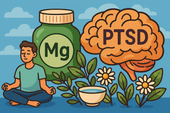
Magnesium and PTSD: Calming the Nervous System
Magnesium is one of the body’s most powerful natural stress relievers. 🌿 Learn how this essential mineral helps calm the nervous system, lower cortisol, ease anxiety, and support better sleep—making it a key ally for anyone recovering from trauma or PTSD.
-
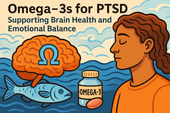
Omega-3s for PTSD: Supporting Brain Health and Emotional Balance
Omega-3s play a vital role in calming the brain and restoring balance after trauma. 🌊 Discover how these essential fatty acids support PTSD recovery by reducing inflammation, balancing neurotransmitters, improving sleep, and promoting emotional resilience—helping your brain heal from the inside out.
-
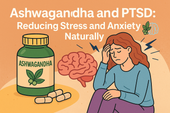
Ashwagandha and PTSD: Reducing Stress and Anxiety Naturally
Ashwagandha offers a natural path to stress and trauma recovery by calming the body’s stress response and restoring hormonal balance. 🌿 Learn how this powerful adaptogen can lower cortisol, ease anxiety, improve sleep, and support emotional resilience for those healing from PTSD.
-
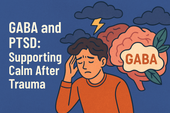
GABA and PTSD: Supporting Calm After Trauma
Therapy helps the brain rewire after trauma, restoring safety and self-trust. 🛋️ Discover how modern therapeutic approaches—like EMDR, CBT, and somatic therapy—help regulate the nervous system, calm intrusive memories, and rebuild emotional resilience for people recovering from PTSD and chronic stress.
-
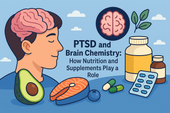
PTSD and Brain Chemistry: How Nutrition and Supplements Play a Role
PTSD isn’t just psychological—it’s deeply biological. 🧠 Learn how trauma reshapes brain chemistry and how nutrition, omega-3s, magnesium, B vitamins, and adaptogens can help rebalance neurotransmitters, reduce inflammation, and support emotional recovery from the inside out.
-
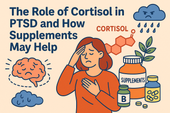
The Role of Cortisol in PTSD and How Supplements May Help
Your adrenal glands play a vital role in how your body responds to stress—but when they’re overworked, fatigue and anxiety can follow. 🌿 Learn how to support adrenal health naturally with nutrients, adaptogens like ashwagandha and rhodiola, and lifestyle habits that restore hormonal balance and steady energy.
-
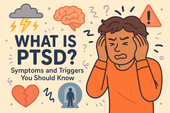
What Is PTSD? Symptoms and Triggers You Should Know
Post-Traumatic Stress Disorder (PTSD) can affect anyone who has experienced deep emotional or physical trauma. 🌪️ Learn how PTSD develops, what symptoms to look for, and the triggers that reignite distress—plus how understanding your body’s response to trauma is the first step toward healing and recovery.
-
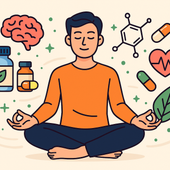
Creating a Daily Supplement Stack for Stress and Cortisol Management: A Science-Based Guide
Building a daily supplement stack for stress and cortisol management can help restore balance, focus, and calm in your life. 🌿 Learn how adaptogens, magnesium, omega-3s, and other key nutrients support your body’s natural stress response from morning to night—so you can feel grounded, energized, and resilient every day.
-
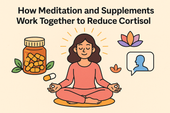
How Meditation and Supplements Work Together to Reduce Cortisol: A Complete Guide to Calming the Mind and Body
Meditation and supplements can work hand in hand to naturally reduce cortisol, your body’s main stress hormone. 🌿 Learn how mindfulness practices, adaptogenic herbs, and nutrient support like magnesium, omega-3s, and B vitamins create a powerful synergy for calm, focus, and emotional balance—backed by science and daily rituals that truly reset your stress response.
-
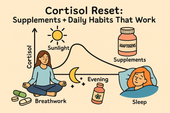
Cortisol Reset: Supplements + Daily Habits That Work
-
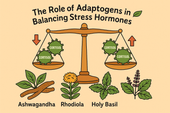
The Role of Adaptogens in Balancing Stress Hormones
Adaptogens work at the root of stress — your nervous system. 🌿 Learn how these powerful herbs help regulate cortisol, calm your nerves, and restore balance between energy and relaxation. ✨
-
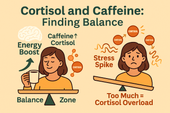
Cortisol and Caffeine: How Much Is Too Much?
Caffeine can boost energy and focus — but too much can overstimulate your stress hormones. ☕ Learn how caffeine affects cortisol, energy levels, and mood, and discover how to find the perfect balance for lasting calm and clarity. 🌿
-
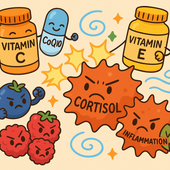
Antioxidants for Stress Management and Cortisol Control
When stress overwhelms your body, antioxidants come to the rescue. 🌿 Learn how vitamin C, CoQ10, and other natural compounds help reduce oxidative stress, regulate cortisol, and restore calm energy from within. ✨
-
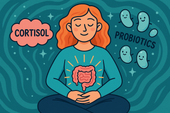
Cortisol and Gut Health: How Probiotics May Help
Chronic stress doesn’t just affect your mind — it changes your gut. 🌿 Learn how cortisol disrupts the microbiome and how probiotics can help restore balance, improve digestion, and calm your stress response naturally. ✨
-

Vitamin D and Cortisol: Supporting Immune Balance
Vitamin D does more than strengthen bones — it helps regulate cortisol and support immune balance. 🌞 Learn how this essential hormone-like nutrient restores calm, improves mood, and strengthens your body’s natural stress defenses. 🌿
-
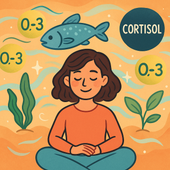
Omega-3s and Cortisol: Fighting Inflammation Naturally
Omega-3s are more than heart-healthy fats — they’re natural cortisol regulators. 🌿 Learn how EPA and DHA help reduce chronic inflammation, calm the nervous system, and support stress recovery from the inside out. ✨
-
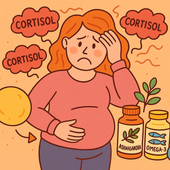
High Cortisol and Belly Fat: Can Supplements Help?
Chronic stress can make belly fat harder to lose — but supplements like ashwagandha, magnesium, and omega-3s may help restore cortisol balance. 🌿 Learn how science-backed nutrients support fat metabolism, calm your stress response, and bring your body back into harmony. ✨
-
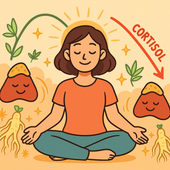
How Ginseng Can Support Energy and Cortisol Balance
Ginseng is one of nature’s most powerful adaptogens, helping your body handle stress without burning out. 🌿 Learn how this ancient root supports balanced cortisol, steady energy, and sharper focus — restoring vitality naturally and sustainably. ✨
-
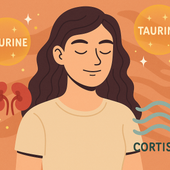
Taurine and Cortisol: Supporting Focus Under Stress
When cortisol surges, focus fades — but taurine helps restore balance. 🌿 Learn how this powerful amino acid calms your nervous system, regulates stress hormones, and sharpens concentration without jitters or fatigue. ✨
-
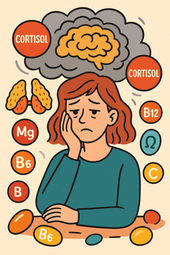
The Link Between Cortisol, Brain Fog, and Nutrient Deficiencies
When brain fog sets in, it’s not just in your head — it’s in your hormones. 🌿 Discover how cortisol imbalance and nutrient deficiencies like low magnesium, B vitamins, and omega-3s can cloud your focus and how restoring balance brings back mental clarity and calm. ✨
-
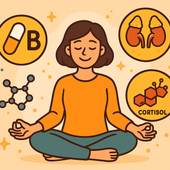
B Vitamins for Stress, Energy, and Cortisol Regulation
B vitamins are the foundation of stress resilience and steady energy. 🌿 Learn how this essential group of nutrients helps regulate cortisol, restore focus, and keep your nervous system calm — giving you balance from the inside out. ✨
-

Cortisol Imbalance and Chronic Fatigue: Can Supplements Help?
When chronic stress keeps cortisol high, fatigue and brain fog follow. 🌿 Learn how to rebalance your stress hormones naturally with calming nutrients, adaptogens, and lifestyle rituals that restore energy, focus, and inner peace. ✨
-

Adaptogen Stacks for Better Sleep and Lower Stress Hormones
Adaptogens can help your body recover from stress and sleep better by regulating key hormones like cortisol and adrenaline. 🌿 Learn how adaptogen stacks work to restore balance, calm the mind, and rebuild resilience — so you can rest deeply and wake renewed. ✨
-

Phosphatidylserine for Nighttime Cortisol Control
When stress hormones stay high at night, deep rest becomes impossible. 🌙 Discover how phosphatidylserine helps calm the brain, reduce nighttime cortisol, and restore healthy sleep rhythms — so you can wake up peaceful, clear, and recharged. ✨
-

Magnesium for Stress Relief and Cortisol Reduction
Magnesium is one of the most powerful natural tools for stress relief. 🌿 This essential mineral calms your nervous system, lowers cortisol, and helps your body recover from chronic tension. Learn how magnesium replenishes balance, improves sleep, and restores inner peace — naturally. ✨
-

Supplements to Improve Sleep by Balancing Cortisol
When cortisol stays high at night, sleep becomes a struggle. 🌙 Discover natural supplements that calm the nervous system, lower stress hormones, and restore your body’s natural rhythm. From magnesium and ashwagandha to L-theanine and phosphatidylserine, learn how to build deeper, more restorative rest. 🌿
-

Cortisol and Sleep: Why Stress Keeps You Awake
When stress keeps your body in fight-or-flight mode, cortisol refuses to calm down — and sleep becomes impossible. 🌙 Learn how elevated cortisol disrupts your circadian rhythm, suppresses melatonin, and turns restless nights into exhaustion. Discover how to restore balance and reclaim deep rest. ✨
-

L-Theanine for Cortisol Balance and Anxiety Relief
L-Theanine — the calming amino acid from green tea — helps quiet the mind and balance cortisol, the body’s key stress hormone. 🌿 Learn how it promotes calm focus, eases anxiety, and supports deep rest without sedation, backed by modern research and centuries of tradition. ✨
-

Rhodiola Rosea and Stress Resilience: A Natural Cortisol Regulator
Rhodiola rosea is one of nature’s most powerful tools for resilience. 🌿 This Arctic root helps balance cortisol, fight fatigue, and sharpen focus — keeping you calm yet energized even under stress. Discover the science behind Rhodiola’s adaptogenic power and how it helps your body thrive under pressure. ✨
-

Ashwagandha for Cortisol Balance: What the Science Says
Ashwagandha helps your body recover from chronic stress by calming the adrenal system and balancing cortisol — your key stress hormone. 🌿 Learn what science says about this powerful adaptogen, how it restores energy and focus, and why it’s one of nature’s most effective tools for modern stress relief. ✨
-

Supplements That Naturally Lower Cortisol Levels
When cortisol levels calm, your energy transforms — no more crashes or jitters, just steady focus and inner peace. 🌿 Learn which natural supplements and habits lower stress hormones, boost calm energy, and help your body thrive with balance instead of burnout. ✨
-

What Is Cortisol Imbalance? Symptoms You Shouldn’t Ignore
Cortisol — your body’s main stress hormone — keeps you alert and energized, but when it’s out of balance, it can drain your health. 🌿 Learn the signs of cortisol imbalance, from fatigue and anxiety to sleep disruption and stubborn weight gain, and discover how to restore calm, energy, and hormonal harmony naturally. ✨
-

The Best Daily Multivitamins for Menopausal Women
Menopause brings new nutritional needs that your old vitamin routine may no longer meet. 🌿 Discover how the right daily multivitamin can boost energy, balance mood, support bone and heart health, and keep your skin glowing. Learn which nutrients truly matter — from vitamin D to magnesium and B12 — to feel strong and vibrant every day. ✨
-

Antioxidants and Menopause: Fighting Inflammation Naturally
During menopause, oxidative stress and inflammation can quietly accelerate aging, fatigue, and skin changes. 🌿 Learn how antioxidants — from vitamins C and E to polyphenols in berries and green tea — help neutralize free radicals, reduce inflammation, and restore balance naturally. Discover the science of radiant, resilient aging. ✨
-

How CoQ10 Supports Heart Health After Menopause
After menopause, heart health becomes more important than ever. ❤️ Discover how CoQ10 — your body’s natural energy molecule — supports cardiovascular strength, restores vitality, and protects against oxidative stress. Learn how this essential nutrient helps keep your heart energized, balanced, and resilient through every stage of life. 🌿
-

Collagen Supplements for Skin and Joint Health Post-Menopause
After menopause, collagen loss affects both skin elasticity and joint comfort — but supplements can help rebuild from within. 🌸 Learn how collagen peptides, vitamin C, and other nutrients work together to restore firmness, reduce stiffness, and keep you glowing and mobile well into your next chapter. ✨
-

Calcium and Vitamin D: Protecting Bone Health in Menopause
Menopause brings hormonal changes that can weaken bones—but with the right nutrients, strength and stability can be rebuilt. 🦴 Learn how calcium and vitamin D work together to protect bone density, prevent fractures, and keep your body resilient. This guide explores nutrition, sunlight, and lifestyle habits that help your bones stay strong and vibrant for years to come. ☀️💪
-

Adaptogens for Energy and Resilience During Menopause
Feeling drained or emotionally scattered during menopause? 🌿 Discover how adaptogenic herbs like Ashwagandha, Rhodiola, and Ginseng can restore energy, balance cortisol, and build emotional resilience. Learn how these natural allies work with your body—not against it—to help you stay strong, focused, and calm through life’s hormonal changes. 🌸
-

Supplements That Help Beat Menopause Fatigue
Menopause fatigue can feel like more than tiredness—it’s a total energy crash. This guide explores how specific supplements, mindful breathwork, and therapy can help restore balance. Learn how nutrients like B vitamins, magnesium, and adaptogens rebuild your stamina, while breathwork and emotional healing calm your nervous system and bring vitality back to your days. 🌿✨
-

Herbal Blends for Menopausal Restlessness: Finding Calm in Transition
Herbal blends bring the wisdom of nature into moments of rest and renewal. Discover how soothing herbs like chamomile, lemon balm, and ashwagandha work together to calm menopausal restlessness, balance hormones, and invite deep relaxation. 🌿💫
-

Magnesium + Glycine for Deep Sleep During Menopause
Nutrients like magnesium, glycine, and B vitamins form the foundation for deep, restorative sleep during menopause. Discover how these natural compounds calm your nervous system, balance hormones, and help you wake up refreshed and recharged. 🌿💤
-

Melatonin and Menopause: Restoring Your Sleep Cycle
Nutrients are the foundation of hormone balance and energy. Learn how vitamins, minerals, and whole foods like greens, salmon, and berries nourish women’s bodies during menopause and beyond — restoring vitality, mood, and strength. 🌿🥗
-

How L-Theanine Helps With Menopausal Anxiety
Science continually deepens our understanding of the human body, from hormones to neurotransmitters. Discover how evidence-based research shapes modern wellness — bridging natural medicine, neuroscience, and hormone balance for healthier living. 🔬🌿
-

Can Ginkgo Biloba Improve Memory in Menopausal Women?
Hormone therapy can be a powerful tool for easing menopause symptoms and restoring balance. Learn how it works, the types available, and how to combine it safely with lifestyle and natural support for optimal well-being. 🌸💊
-

B Vitamins for Mental Clarity During Menopause
Nutrients are the foundation of mental and physical balance during menopause. Discover how vitamins, minerals, and whole foods like leafy greens, fish, nuts, and citrus can fuel energy, clarity, and calm while supporting hormonal health. 🌿✨
-

Mood Swings and Menopause: Natural Nutrient Support
Probiotics do more than support digestion — they help balance mood, hormones, and immunity too. Learn how a healthy gut microbiome can ease menopause symptoms, boost energy, and improve emotional resilience naturally. 🌿🦠
-

Brain Fog in Menopause: Supplements That May Help
Supplements can be powerful allies in restoring balance, energy, and focus—especially during menopause. Learn how nutrients like omega-3s, vitamin D, magnesium, and herbal adaptogens work together to support brain health, reduce stress, and promote lasting vitality. 🌿💊
-

Adaptogen Stacks for Reducing Night Sweats
Hormone detox isn’t about cleansing your body—it’s about restoring flow. Learn how the liver, gut, and endocrine systems work together to eliminate hormone buildup and how herbs like milk thistle, dandelion, and schisandra support balance, clarity, and natural vitality. 🌿💫
-

Cooling Menopause Symptoms with Herbal Support
Ashwagandha is one of nature’s most powerful adaptogens, helping women manage stress, sleep better, and balance hormones naturally. Discover how this ancient root supports calm energy, emotional resilience, and relief from menopause-related anxiety and fatigue. 🌿💫

















































